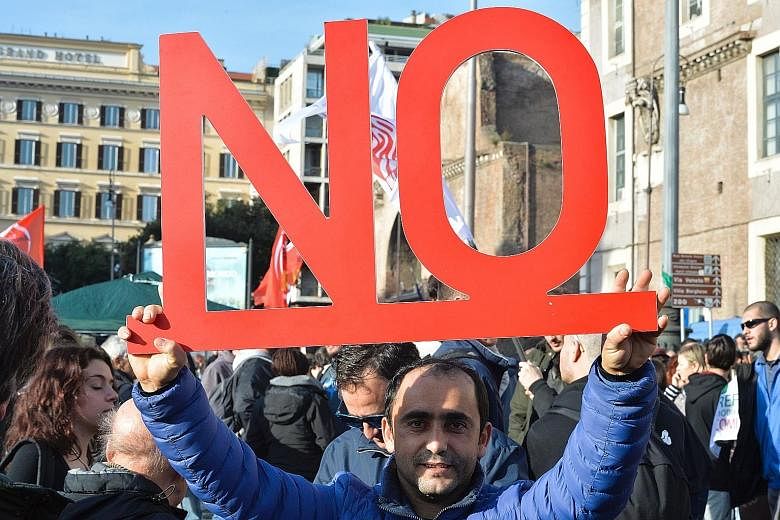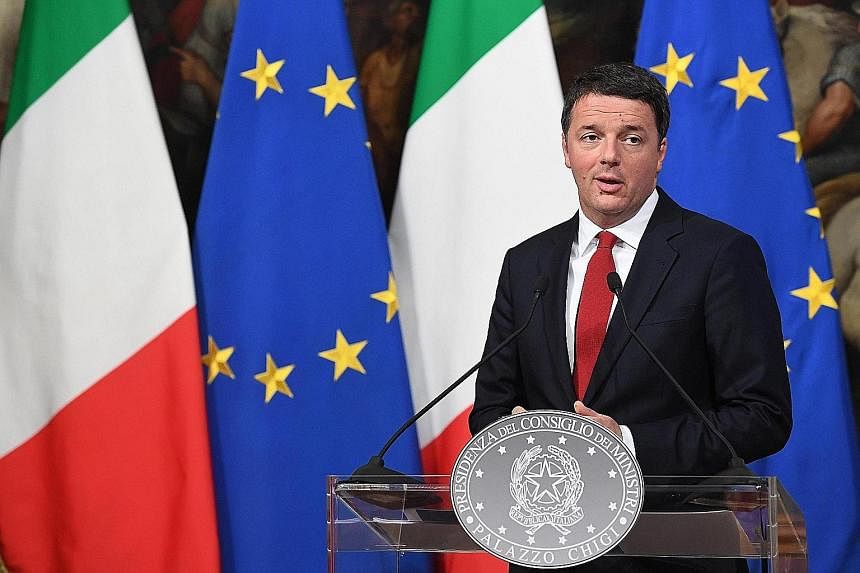Still smarting from Britain's shock Brexit referendum vote, European governments are steeling themselves for a further major potential upset this Sunday: Another referendum, this time in Italy, which could rock the European Union (EU) to its foundations.
As is often the case when facing a looming disaster, EU leaders remain tight-lipped and profess to be unconcerned. Privately, however, diplomats in every European capital admit that there is little they can do to influence the outcome of Sunday's vote, which technically concerns only Italy's constitutional reforms, but is in practice about the country's economic solvency.
Paradoxically, Italian Prime Minister Matteo Renzi called the referendum precisely in order to avert a European crisis.
The 41-year-old centre-left politician wants to overhaul Italy's sclerotic political system; Italians will therefore be asked on Sunday to approve the biggest package of constitutional reforms since 1947.
Mr Renzi's ambitions are breathtaking. He is planning to claw back powers from Italy's 20 national regions. He is also proposing to replace the Senate - the country's directly elected 315-member Upper House of Parliament - with a smaller new chamber which will be less powerful and indirectly elected.
And as if that is not enough, Mr Renzi is also asking Italians to approve a new electoral law ensuring that the party which comes first in future general elections will be automatically guaranteed 54 per cent of parliamentary seats even if it obtained, say, only a third of the popular vote.
In theory, the reforms make sense. Italy's regions are an unending source of corruption. As currently constituted, the Senate has the same powers as the Lower House of Parliament, so legislation travels constantly between the two chambers, creating gridlock.
And then there is the electoral system, which has been tweaked three times since World War II but has not succeeded in providing stable governance: Italy has experienced an astonishing 65 different Cabinets during the past seven decades.
The reforms offer "the best opportunity Italians have to think about their children's future", the Italian Prime Minister argued in a recent rally, urging voters to approve his proposals.
Nevertheless, all the indications are that Italians will reject the constitutional package: The latest surveys published, before a polling ban came into force, indicated that up to 55 per cent of the population is likely to cast a "no" ballot on Sunday.
Opposition to Mr Renzi's reforms comes from politicians and constitutional experts who accuse the Prime Minister of ramming them through just to make himself more powerful.
Mr Ferruccio De Bortoli, a noted commentator and former editor of Corriere della Sera, Italy's oldest and most respected daily, castigated Mr Renzi for "peddling false justifications" for his reforms.
But for many ordinary Italians, constitutional reform is simply an irrelevant answer to their real problem, which is economic stagnation.
Measured by gross domestic product per person at constant prices, Italians today are poorer than they were two decades ago; the rest of the Europeans are a third richer, on average. At 12 per cent of the labour force, Italy's unemployment rate is also among Europe's highest, three times bigger than Germany's.
Although Prime Minister Renzi vowed that under his stewardship, Italy will be "doing better than Germany", growth in the Italian economy remains half the EU average.
Constitutional reforms offer no answer to such ills; at best, they merely presage better future governance, precisely when Italy has no time to spare.
Mr Renzi has vowed to resign if he loses the referendum. That will prompt new elections which will benefit the anti-establishment Five Star Movement, already the second- most popular party in the country.
Mr Beppe Grillo, a former comedian who is the party's founder, regularly accuses the Prime Minister of "lying", and vows to pull Italy out of the euro currency system if he comes to power.
Yet what really worries the rest of Europe is the fate of the country's banks. Italy's banking system is staggering under €360 billion (S$547 billion) in bad loans. Almost any outcome that destabilises Italian politics would send tremors through the country's rickety financial system, and may topple three ailing banks, with dramatic implications for the entire euro zone.
But the opportunities to save Italy from bankruptcy will be limited. For the country is too big to be bailed out like Greece was, and German Chancellor Angela Merkel, who would be expected to bankroll any deal, is facing her own general election next year and will not risk domestic unpopularity by offering fresh cash.
In short, a perfect political and economic storm may be brewing.
Mr Renzi's referendum gamble is eerily reminiscent of the gamble which British Prime Minister David Cameron took and lost earlier this year with his own EU referendum.
Mr Renzi's only hope is that, just as British pollsters were wrong in predicting that referendum's outcome, Italy's pollsters will also be wrong this time.


